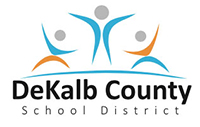School program is first-of-its-kind in Georgia
What can getting rid of Styrofoam trays do for a school cafeteria? How can switching to reusable silverware benefit the environment? What happens when a school begins to separate trash by type and material? What happens when a school makes a concerted effort to recycle?
 At one DeKalb County School District (DCSD) elementary school, the answers to such questions have united a school community and created positive, exemplary change.
At one DeKalb County School District (DCSD) elementary school, the answers to such questions have united a school community and created positive, exemplary change.
Fernbank Elementary School, in partnership with the school’s Parent Teacher Association and DCSD Food & Nutrition Services, launched the Fernbank Sustainability Initiative at the beginning of the 2018-2019 school year. The pilot program, which features a wide array of sustainable cafeteria practices, is the first of its kind in the state of Georgia and proving to be a trailblazer in metro Atlanta.
“Not only have we had lots of volunteers from the parent community, but from other DCSD schools, Atlanta Public Schools, Fulton County Schools and Decatur City Schools,” said Fernbank principal Joan Ray. “People are interested to see what we’re doing and how they can do the same thing at their schools. It has sparked a lot of chatter across a lot of channels.”
The Fernbank Sustainability Initiative includes replacing Styrofoam trays with single-use, compostable trays; replacing plastic utensils with reusable silverware; separating trash by type; reusing food waste as compost; recycling not just paper and plastic, but also milk; parent and teacher volunteers at new waste stations; and the creation of a share table for unopened, uneaten food.
When finished eating, if a student doesn’t eat a banana or packaged snack, for example, the items are placed on a share table for others to eat at their leisure. Students are then guided through a waste line separated by recyclables, landfill trash, compostable waste (food, new trays, etc.), and buckets to store milk. Similarly, instead of throwing away single-use sporks and plastic knives, students use actual silverware that is washed daily.
The end result? An environmentally conscious, resource responsible, and sustainable school cafeteria at Fernbank Elementary. In addition, students are putting to practice things learned in the classroom.
“This has been a great shift,” Ray said. “It’s a wonderful way to support our school climate, and falls in line with everything students learn in STEM and International Baccalaureate (IB). It works in concert with all of the curriculum items we’ve been looking at. The students have the unique opportunity to see how to solve problems on a firsthand basis. It helps us practice what we preach.”
Students have gone “all-in” on the practices, according to Ray, mostly because they can speak on the issues involved. Students put together a video explaining the initiative and why it’s important to Fernbank Elementary.
The school estimates it has stopped using and disposing of 700 Styrofoam trays per day, and nutrition experts say that students will be the first to benefit in terms of health.
“Hot foods and liquids actually start a partial breakdown of Styrofoam,” reads the Fernbank Sustainability Initiative’s summary. “This causes some toxins to be absorbed into the bloodstream and other tissues.”
 Ray attributes most of the buy-in and outside interest to the initiative to this single fact.
Ray attributes most of the buy-in and outside interest to the initiative to this single fact.
“People want their kids to be as healthy as possible,” she said. “It has been proven that Styrofoam can potentially expose students to carcinogens on a daily basis. This has been something parents have wanted to do.”
According to school officials, the integration of “green practices” began as early as 2013 with the creation of the Go Green Club and commitment to the Healthy Schools Initiative. In 2015, Fernbank took it one step further with a schoolwide recycling program, lunch trash sorting days, and a school garden project. By 2017, Fernbank initiated an end-of-year school supply diversion, saving $300 and 287 pounds of waste, added turf to irrigate water responsibly, and expanded the school garden into an outdoor classroom.
Future plans during the 2018-2019 school year include applying the Fernbank Sustainability Initiative to all school functions—including afterschool events—as well as the creation of safe school commute routes, applying for grants and certifications, and helping other schools throughout DCSD and beyond adopt a similar model.
“To make this happen, it feels like a great success for our kids. It feels good to do something that’s right for our kids,” Ray said.
For more information on Fernbank Elementary and the Fernbank Sustainability Initiative, visit the school website.
Video created by members of the Fernbank Elementary School PTA


